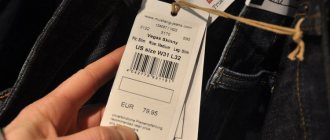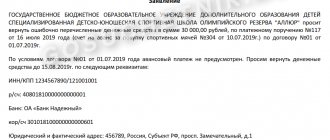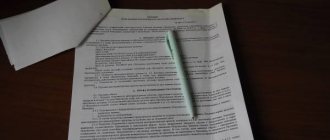Can a seller refuse to return a product purchased at a discount?
No. Even if in the store you see an information sign “Products purchased at a discount cannot be returned or exchanged,” you have every right to challenge this information by referring to the Law “On Protection of Consumer Rights,” which does not contain information about returning the product , purchased at a discount, is not allowed.
If the seller refers to another Russian law that prohibits returning goods at a discount, then know that this is illegal and there is no other law.
Is it possible to return items purchased on sale?
Basically, the sale is a quick sale of an old collection. Thus, the store sells quality items. This is especially true for large retail outlets, where there is a huge turnover of goods. Sale is one way to get rid of old products. It is for this reason that the store administration lowers prices for products. However, the essence of the transaction between the seller and the buyer does not change.
This analysis of the sale principle suggests that it is fully subject to the Law “On the Protection of Consumer Rights”. Therefore, a client who purchased an item at a sale, having identified defects at the first one, has every right to return the product back, demanding money, or exchange it for another that is suitable in price, color, style and other parameters.
The buyer must remember that the seller cannot refuse the consumer's claim, even if the product was purchased on sale. Any announcements about the impossibility of returning this category of goods are unfounded. It is advisable not to lose fiscal receipts and other documents related to purchases. With their help, it is much easier to prove that you are right, if necessary.
If the check is not found, then do not despair. After all, the law does not prohibit you from seeking your rights in its absence. Testimonies from acquaintances or other people who were near the plaintiff at the time of purchase of the goods will be useful here.
A label on which the article is indicated can also act as an assistant. Basically, such information is clearly recorded in the store documentation. If all the data matches, then the seller is obliged to acknowledge the fact that the product was purchased in his store.
It must be remembered that an item purchased at a discount, which is not defective, but only obsolete, cannot be considered of poor quality. Thus, the manufacturer must be responsible for any defects that appear on the product during its use. The client can contact the store and demand money or exchange. After all, the Law “On Protection of Consumer Rights” is on his side. In this case, claims can be made within 2 years from the date of the transaction.
In the case when sellers blame the client exclusively for all the troubles, without wanting to understand the situation, it is best to seek help from a lawyer. Also, an item with defects can be sent to a specialized expert center.
This is where laboratory tests are carried out to help determine the cause of the defect. Thus, the buyer will receive a corresponding certificate of the results of the examination. If the conclusion confirms the consumer’s aspirations, then the seller will have to pay him not only the debt for the goods, but also pay off all the costs associated with the examination.
How to return a discounted product?
What is a discounted product? A discounted product is considered to be a defective product that has some kind of defect or flaw, which is why its value is significantly reduced.
What is the seller obliged to do when selling such a product? Warn the buyer, in writing or orally, why the discounted item is being sold at a reduced price.
So, for example, if you bought a kettle in a store with a fifty percent discount and the seller warned you before purchasing that the markdown on the kettle was due to the presence of a large scratch on the lid, then you cannot come to this store and demand the return of the purchased product due to the presence he has a deficiency. In addition, you cannot demand to exchange this defective kettle for the same one, but without the defect, or to have it repaired at the store’s expense within the warranty period.
Bottom line: if you bought a defective product at a discount, and the seller warned you in advance that the product had a defect, then you do not have the right to return such a product.
In what case can you return a product purchased at a discount and having a defect? If the seller does not tell the buyer why the item is discounted.
So, for example, if you bought a discounted tablet that has a small crack on the panel, which the seller warned about in advance, and at home you discovered that the “home” button does not work, then you have the right to return it back to the store on the basis of Article 18 of the Law “On the protection of consumer rights.”
According to Article 18, the consumer has the right to return goods with a defect, the existence of which the seller did not warn in advance.
Under this article, you can return any discounted product, except those that cannot be returned in principle (underwear, jewelry, etc.).
Helpful advice
When purchasing a defective product at a discount, ask the seller serving you to confirm the presence of the defect and the associated reduction in the price of the product in writing. This will give you a guarantee that if an unspecified defect is discovered, you will be able to return the discounted item.
Discounted products. Can't return
The store sells shoes with a 40% discount. The counter says "Sale". There is a notice at the cash register stating that warranty periods do not apply to discounted shoes; the instruction agreement contains the same information. On the first day of wearing it, the sole tore, leaving an empty cavity underneath. The store owner refuses to accept the shoes, citing the fact that they are discounted shoes that cannot be returned. In my opinion, she unreasonably uses the term “discounted”, since the shoes are without defects. I need to know who is right in our debate about whether the shoes are discounted or not.
I am also interested in the sequence of actions and timing. I planned to contact the expert, but the owner of the shoe store completely refuses to put a resolution on my return application. She promises to write a refusal within 10 days, while the lady is fickle, it is difficult to find her, since she owns a chain of stores, constantly travels around them, and does not give sellers the authority to write a refusal. She also said that these shoes (autumn shoes without heels) cannot be walked on the roads, and that the utilities are to blame for the fact that the shoes immediately break. In the end, she and I agreed that the shoes would be made at the store’s expense. At the same time, she still believes that she should not bear responsibility, and makes a concession only because she does not want to waste time on explanations with committees and the court.
Indeed, in many stores you can see announcements that goods sold at a discount cannot be exchanged or returned, that there is no guarantee for such goods, etc.
Let's find out how legal this approach to consumer rights is.
Relations arising between consumers and sellers are regulated by the Law of the Russian Federation of 02/07/1992 No. 2300-1 “On the Protection of Consumer Rights”.
This Law, while establishing the rights of consumers in relation to the goods they purchase, does not make the possibility of exercising these rights dependent on the price at which
(full or reduced) the buyer purchased the goods.
The seller himself sets the price at which it is profitable for him to sell the goods, and the buyer, by purchasing this product, thereby agrees with the price offered by the seller ( Articles 424, 485 of the Civil Code of the Russian Federation
).
This also applies to cases when the seller reduces the prices initially set for goods - due to defects in the goods, in order to increase sales of goods, etc.
Moreover, neither the Civil Code of the Russian Federation nor the Law on the Protection of Consumer Rights operate with such concepts as “discounted goods”, “discounted goods”, “sale goods”, etc.
The scope of rights of a consumer who has discovered defects in a product is the same
at any (full or reduced) price of the product.
According to paragraph 1 of Art. 18 of the Law on the Protection of Consumer Rights, the consumer in case of detection of defects
,
if they were not specified
by the seller, at his own discretion have the right:
– demand replacement
for goods
of the same
brand (same model and (or) article);
– demand replacement
for the same product
a different
brand (model, article) with a corresponding recalculation of the purchase price;
– demand a proportionate reduction
purchase price;
– demand immediate elimination of deficiencies
goods or reimbursement of costs for their correction by the consumer or a third party;
– refuse to execute the purchase and sale agreement and demand a return
the amount paid for the goods. In this case, at the request of the seller and at his expense, the consumer must return the goods with defects.
The consumer also has the right to demand full compensation for losses
caused to him as a result of the sale of goods of inadequate quality.
For technically complex products
(according to the list approved by the Government of the Russian Federation) the consumer, if defects are discovered in it, has the right to refuse to fulfill the sales contract and demand a refund of the amount paid for such a product or make a demand for its replacement with a product of the same brand (model, article) or the same the same product of a different brand (model, article) with a corresponding recalculation of the purchase price
within fifteen days
from the date of transfer of such product to the consumer.
After this period, these requirements must be satisfied in one of the following cases:
– detection of a significant defect in the product;
– violation of deadlines for eliminating product defects;
– the impossibility of using the product during each year of the warranty period for a total of more than thirty days due to repeated elimination of its various deficiencies.
All of the above requirements, as follows from paragraph 1 of Art. 18 of the Law on the Protection of Consumer Rights, the buyer can present if defects are discovered in the product that were not specified by the seller
.
It follows from this that if the product has a defect, and the seller knows about it, then provided that the seller warns
the buyer about such a defect in the goods, the buyer will not have the right to present his claims to the seller in connection with this defect.
For example, household appliance stores sometimes sell equipment that has external defects
(such as chipped enamel, scratches, etc.), but quite capable of performing its basic functions.
The seller, as a rule, sets a price for such equipment that is lower than the prices for similar models of household appliances without defects.
When selling such equipment, the seller warns
the buyer (for reliability - in writing) about the presence of external defects.
Having purchased such household appliances, the buyer will not have the right to make claims regarding external defects specified by the seller, but if, for example, the iron stops heating, then the buyer will have the right to make claims to the seller
on replacement of goods, return of money paid for it and other requirements in accordance with Art. 18 of the Law on Protection of Consumer Rights.
Thus, the buyer has the right to present claims to the seller in accordance with Art. 18 of the Consumer Protection Act regarding any defects
goods that
were not specified
by the seller.
According to Art. 19 of this Law, the consumer has the right to present the provisions provided for in Art. 18 of the Law requirements for the seller (manufacturer, authorized organization or authorized individual entrepreneur, importer) regarding defects in the goods if they are discovered during the warranty
date or expiration date.
But if the warranty period or expiration date for the product is not established
, this does not mean that the buyer will have to come to terms with the fact that his purchase turned out to be of poor quality.
Note!
In relation to goods for which warranty periods or expiration dates are not established
, the consumer has the right to make these demands if defects in the goods are discovered
within a reasonable time
, but within
two years
from the date of their transfer to the consumer, unless longer periods are established by law or contract.
Moreover, in relation to goods for which a warranty period is established
, the seller (manufacturer), an authorized organization or an authorized individual entrepreneur, the importer is responsible for defects in the goods
unless he proves
that they arose after the goods were transferred to the consumer as a result of the consumer’s violation of the rules for using, storing or transporting the goods, the actions of third parties or force majeure.
For defects in a product that is not installed
warranty period, the seller (manufacturer), an authorized organization or an authorized individual entrepreneur, the importer is responsible only if
the consumer
proves that they arose before the transfer of the goods to the consumer or for reasons that arose before that moment.
That is, in the case when the warranty period for the product is not established (as in your situation), it is on the consumer
The law imposes the obligation to prove that even before the moment of purchase the goods were defective (or there were reasons that led to the occurrence of a defect).
However, clause 5 of the Law on the Protection of Consumer Rights obliges
the seller
to accept goods of inadequate quality from the consumer and, if necessary, conduct a quality check of this product. The consumer has the right to participate in checking the quality of the product.
In case of dispute about the reasons
the occurrence of defects in the goods, the seller (manufacturer), an authorized organization or an authorized individual entrepreneur, the importer are obliged to conduct an examination of the goods
at their own expense
.
It turns out that although in the case where the warranty period is not established
, The law obliges the consumer to prove that the defect or reasons for the defect of the product occurred even before the moment of purchase, however, the seller
is obliged
to accept low-quality goods from the consumer and, if the parties’ opinions about the reasons for the defects differ, it is
the seller who
is obliged to carry out an examination of the product
at his own expense
.
The consumer has the right to be present during the examination of the goods and, in case of disagreement with its results, to challenge the conclusion of such examination in court.
If, as a result of an examination of the product, it is established that its defects arose due to circumstances for which the seller (manufacturer) is not responsible, the consumer is obliged to compensate
to the seller (manufacturer), authorized organization or authorized individual entrepreneur, importer,
the costs
of conducting the examination, as well as the associated costs of storing and transporting the goods.
According to the explanations given by the Ministry of Aviation Administration of the Russian Federation in order No. 160 dated May 20, 1998, by agreement between the consumer and the seller, the consumer may not transfer the goods for quality control (examination) to the seller, but submit an examination report to a third-party organization
.
In this case, the seller must reimburse the consumer for the costs of the examination, since clause 5 of Art. 18 of the Law on the Protection of Consumer Rights provides for an examination at the expense of the seller
.
That is, the buyer can conduct an independent examination at his own expense if the seller agrees to this.
If the seller evades his obligation to accept a low-quality product from the buyer and check its quality, then the buyer has only one option: go to court.
Let us remind you that claims for the protection of consumer rights can be brought, at the choice of the plaintiff (consumer), to the court at the place:
– location of the organization, and if the defendant is an individual entrepreneur, – his residence;
– residence or stay of the plaintiff;
– conclusion or execution of a contract.
If a claim against an organization arises from the activities of its branch or representative office, it may be brought to court at the location of its branch or representative office (Article 17 of the Law on the Protection of Consumer Rights).
As for the store owner’s statements that “you can’t walk on the roads in these shoes,” etc. statements from sellers, then you need to remember that the seller (performer) is obliged to transfer to the consumer a product (perform work, provide a service), the quality of which corresponds to the contract.
If there are no conditions in the contract regarding the quality of the goods (work, services), the seller (performer) is obliged to transfer to the consumer the goods (perform work, provide services) that correspond to the usually presented
requirements and suitable for the purposes for which a product (work, service) of this kind
is usually used
(Article 4 of the Law).
Obviously, people usually wear shoes, including on the street.
If, for example, shoes have leather soles that quickly wear out when walking down the street, then the seller must additionally warn the buyer about this.
The manufacturer (performer, seller) is obliged to provide the consumer with the necessary and reliable information about the goods
(works, services), ensuring the possibility of their correct choice (Article 10 of the Law).
The seller (executor) who did not provide
the buyer of complete and reliable information about the product (work, service)
bears the responsibility
provided for in paragraphs 1-4 of Art.
18 or clause 1 of Art. 29 of the Law, for defects in a product (work, service) that arose after its transfer to the consumer due to the lack of such information
(Article 12 of the Law).
Thus, if the shoes you purchased were intended only for indoor use, but you were not informed about this, and as a result of walking on the street, shortcomings arose in the shoes, then you have the right to demand a replacement of the product, a reduction in the purchase price, or free repair.
The Consumer Rights Protection Law provides for specific deadlines for satisfying consumer demands and penalties for violating them.
If the deadline for eliminating deficiencies
goods are not defined in writing by agreement of the parties, these defects must be eliminated by the manufacturer (seller, authorized organization or authorized individual entrepreneur, importer)
immediately
, that is, within
the minimum period
objectively necessary to eliminate them, taking into account the usually used method. The period for eliminating defects in the goods, determined in writing by agreement of the parties, cannot exceed forty-five days (Article 20 of the Law).
If the consumer discovers defects in the product and submits a request for its replacement
the seller is obliged to replace such goods within
seven days
from the date of presentation of the specified demand by the consumer, and if additional verification of the quality of such goods by the seller (manufacturer, authorized organization or authorized individual entrepreneur, importer) is necessary - within
twenty days
from the date of presentation of the specified demand.
If the seller does not have the goods necessary for replacement at the time of submitting the demand, the replacement must be carried out within a month
from the date of presentation of such a demand (Article 21 of the Law).
Consumer demands for proportionate reduction
the purchase price of the goods,
reimbursement of expenses
for correcting defects in the goods by the consumer or a third party,
return of
the amount of money paid for the goods, as well as a claim for compensation
losses
caused to the consumer as a result of the sale of goods of inadequate quality or the provision of inadequate information about the goods, are subject to satisfaction by the seller within
ten days
from the date of presentation of the corresponding demand (Article 22 of the Law).
For violation of the above deadlines, the seller who committed such violations pays the consumer a penalty for each day of delay.
in the amount of one percent of the price of the goods (Article 23 of the Law).
Note!
Art. 16 of the Law on Protection of Consumer Rights stipulates that the terms of the contract
, which infringe on consumer rights in comparison with the rules established by laws or other legal acts of the Russian Federation in the field of consumer rights protection, are declared
invalid
.
In other words, the seller has no right
deny you satisfaction of claims to which you are entitled in accordance with the law, even if you signed the text of the memo, which states that the goods you purchased at a reduced price cannot be exchanged or returned.
Warnings (in the form of signs, announcements, etc.) that goods (discounted or sold at a discount) cannot be
, which are quite common in stores.
Sellers and buyers should remember that satisfying consumer demands in court will cost the seller 1.5 times more
than if he satisfied the consumer’s demands voluntarily, without court intervention: Art.
13 of the Law provides for a fine of fifty percent
of the amount awarded by the court in favor of the consumer.
Taking into account the fact that the court in most cases supports the consumer (as the least protected party and prepared for such situations), it is not at all profitable for sellers to bring the case to court.
How to return an item from a sale?
What is a clearance item? Unlike discounted goods, goods on sale do not have any defects and are sold at a discount as part of the liquidation of goods from the past season.
In this case, according to the Law “On the Protection of Consumer Rights,” goods purchased at a discount are subject to return. In this case, the standard conditions for returning goods of proper quality must be met, namely:
- No more than fourteen days must have passed from the date of purchase (not counting the day of purchase of the item on sale);
- The discounted product did not fit the shape, style, size, color or configuration;
- The buyer kept the receipt;
If there is no receipt, then the buyer can ask the store staff to check the history of the cash register tape, which duplicates the information specified in the receipt issued to the buyer.
- The product has retained its presentation;
This means that the buyer did not have time to cut off all the tags, labels, peel off stickers, etc.
- The product has not been used;
If this is clothing, then when returning it it should not be washed, soiled, or torn. If this is some kind of equipment, then it should not be scratched, littered, etc.
What can a buyer expect when returning such an item purchased at a discount from a sale?
- In exchange for the same product, but with suitable characteristics;
- For exchange for goods of a different brand, of a different value with recalculation of the cost of the goods;
This option is provided if a similar product with suitable characteristics (color, style, size, etc.) is not available.
- To return the cost of the product in exchange for its return;
It is provided in the event that a suitable product is not available at the time of the buyer’s request, and the buyer does not want to wait until it is delivered.
Bottom line: you can return a discounted product purchased at a sale according to the same rules as a regular product of good quality.
Refund to the buyer not on the day of purchase
Such situations happen more often. After all, the buyer, as a rule, becomes convinced that the product is not suitable when he returns home, when he examines and checks it properly.
What are the rules for returning money to the buyer in this case?
He must write an application for a refund. The application form is arbitrary, but it must indicate the buyer’s full name, the name of the product in accordance with his passport or document confirming payment for the goods, the reason why the product is being returned, as well as the requirement to replace the purchase or return the money for it. The form and sample application for returning goods can be downloaded on our website.
In addition, the buyer presents a receipt and passport.
Just as in the first case, it is necessary to issue an invoice, which is signed by both the seller and the client.
Refunds to the buyer must be made within three days after the request.
Please note: if you have several cash registers, then the money in this case should be returned not from the operating room, but from the main cash register of the organization. In this case, there is no need to draw up a KM-3 act on the return of money - the money is issued according to a cash receipt order based on the buyer’s passport. After this, the cashier records the RKO in the cash book. The expense order form can also be downloaded for free on our website, and instructions for filling it out are also published there.
Once again we list the documents for returning goods from the buyer not on the day of purchase. A check, passport and application are required from the client. The seller fills out the invoice for the returned goods, for example, according to the TORG-13 form, signs it from the buyer and issues money according to the cash receipt order.










